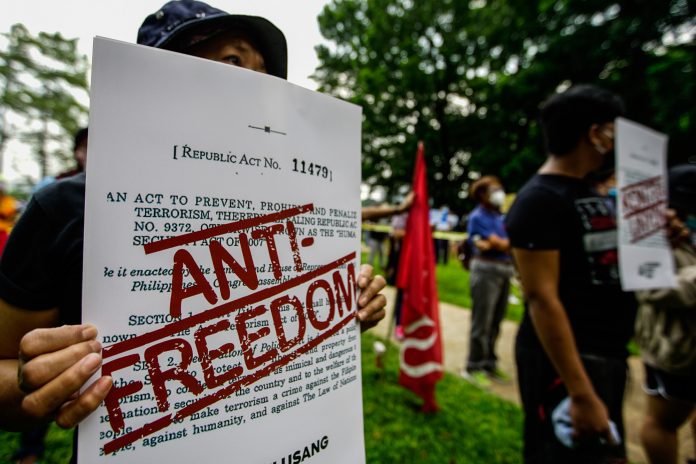The cat is now out of the bag.
The Anti-Terrorism Act, as revealed by President Rodrigo Duterte himself recently, is not only directed at the Abu Sayyaf, Maute Group, Bangsamoro Islamic Freedom Fighters and other groups in Mindanao that have pledged allegiance to the savage Islamic State, but also at putting an end to the more than 50-year old communist rebellion.
The new law served to complement the Duterte administration’s whole-of-nation approach to fighting the armed rebellion being waged by the Communist Party of the Philippines (CPP), its armed component the New People’s Army, and its political arm, the National Democratic Front (NDF), since the late 1960s.
In other words, the new law is a double-edged sword designed to solve two internal security problems that we’re told stand in the way of economic development.
Going hammer and tongs after domestic and foreign Islamic fundamentalists bent on establishing a caliphate in Southeast Asia with Mindanao as its base is no doubt an urgent need after the Marawi siege that left the Islamic city in ruins and still needs to be reconstructed after three years.
The armed forces has been running after the New People’s Army (NPA) since 1968 but has only managed to whittle down its membership to an estimated 4,000 full-time guerrillas today from a high of 25,000 in the 1980s.
The long-drawn rebellion mostly in the countryside is acknowledged by observers to be an unwinnable war.
Why? The rebels can always recruit new members from the ranks of poor farmers and indigenous peoples as well as idealistic youth from the urban areas.
The military, despite its superiority in manpower and materiel, including sophisticated attack helicopters that can swoop down on rebel bases in the jungle, cannot wage all-out war against the rebels without inflicting casualties on innocent civilians caught in the crossfire, or displacing them from their homes and farms.
The Duterte administration tried to restart the stalled peace talks with the NDF in 2016, but was scuttled less than a year later after the rebels refused to agree to a bilateral ceasefire while the talks were ongoing to discuss the substantive agenda involving social and economic reforms as well as political-electoral reforms.
The government now probably wants to formally declare the NPA as a terrorist organization so that it can go after not only those fighting the military in the rural areas, but also their alleged supporters and sympathizers in both city and countryside.
And that’s where the crux of the matter lies in so far as the anti-terror law in concerned.
The military insists that CPP-NPA-NDF has succeeded in building a political infrastructure that includes legal or aboveground organizations.
These include organizations of the basic sectors — farmers, workers, youth, women, indigenous peoples — as well as those engaged in defense of human rights, and faith-based groups, among others.
Even the Makabayan bloc of party-list groups in the House of Representatives appears to be in the crosshairs of the military as suspected supporters of the underground movement, which the lawmakers stoutly deny.
The very real fear of the critics of the anti-terror law, which includes former justices of the Supreme Court, businessmen, lawyers’ groups and Church officials, is that the Duterte administration could target not only the legal organizations the military claims are communist-fronts, but also those who are merely exercising their rights guaranteed by the Constitution, such as press freedom, freedom of speech and expression, and freedom to peaceably assemble and air grievances in public.
Critics have also pointed out that the anti-terror law could be used to conduct indiscriminate warrantless arrests and prolonged detention, plant firearms and explosives and documents and seize the assets of those suspected of even just “inciting to terrorism.”
With Duterte apparently bent on putting an end to both terrorism and armed rebellion before his constitutional term ends in 2022, or two years from now, we are worried that he will pursue a scorched-earth policy and declare all-out war against all perceived terrorists, and even mere critics of his administration.
The take-no-prisoners approach of the current dispensation towards the problem of illegal drugs, once extended to the war on terror, could inevitably lead to human rights abuses on a grand scale and the total breakdown of the rule of law in the country.
Forewarned is forearmed.
Ernesto M. Hilario writes on political and social justice issues for various publications in the Philippines. The views and opinions expressed in this article are those of the author and do not necessarily reflect the official editorial position of LiCAS.news.









